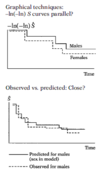Ch 4. Evaluating the Proportional Hazards Assumption Flashcards
(6 cards)
General approaches for assessing the PH assumption (3)
- graphical
- goodness-of-fit test
- time-dependent variables
Types of graphical techniques to assess PH assumption
To compare:
- –ln(–ln) Survivor curves are parallel
- observed vs predicted survivor curse are close

Goodness-of-fit (GOF) tests for assessing the PH assumption
- Provides large sample Z or chi-square statistics (which can be computed for each variable in the model, adjusted for the other variables in the model).
- A p-value derived from a standard normal statistic is also given for each variable.
This p-value is used for evaluating the PH assumption for that variable
- p-value large(non-significant) => PH satisfied
- p-value small (e.g. P<0.05) => PH not satisfied
Time-dependent variables for assessing the PH assumption for a time-independent variable
Extended Cox model:
Add product term involving some function of time.

Pros of the 3 approaches for assessing PH assumption
- GOF provides a single test statistic for each variable but it might be too ‘global’ and it may not detect departures from PH (and other 2 can)
- Graphical: subjective
- Time-dependent: computationally cumbersome
Graphical Approach to assess PH assumptions 1: Log–Log Plots
A log–log survival curve is simply a transformation of an estimated survival curve that results from taking the natural log of an estimated survival probability twice.:
-ln(-ln ^S)
- ln ^S is negative => -(ln ^S) is positive.
- can’t take log of ln ^S, but can take log of (-ln ^S).
- -ln(-ln ^S) may be positive or negative.


